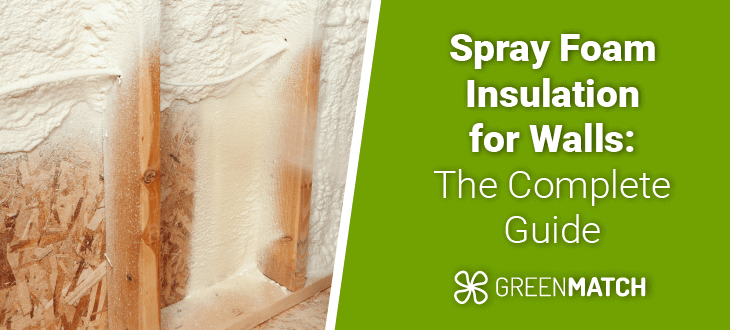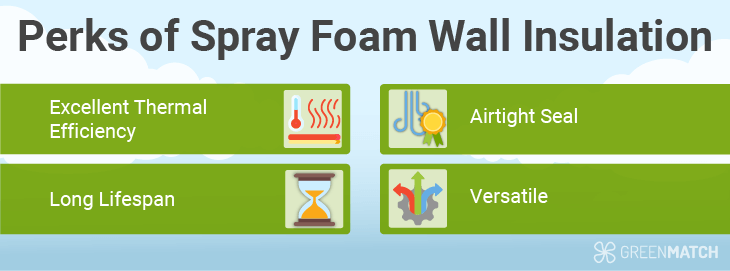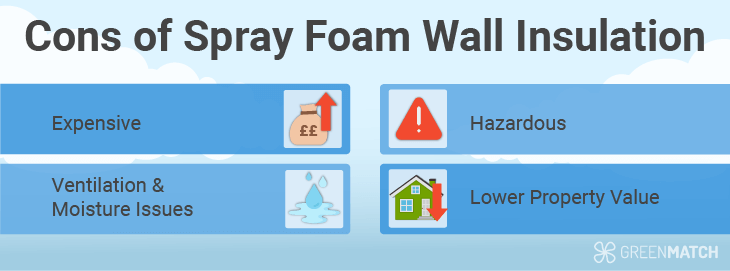Answer these simple questions and we will find you the BEST prices
Which type of solar quotes do you need?
It only takes 30 seconds
100% free with no obligation

Get Free quotes from insulation specialists near you

Save money by comparing quotes and choosing the most competitive offer

The service is 100% free and with no obligation
- GreenMatch
- Insulation
- Spray Foam Insulation
- Foam Wall Insulation
Foam Wall Insulation: Applications, Pros, Cons & Costs


- Foam wall insulation is one of the most thermally effective insulation materials, with polyurethane foam exhibiting an r-value of up to 4.5 m²K/W.
- Polyurethane spray foam costs around £21.5 per m2, putting it on the costlier end of insulation materials.
- Spray foam insulation is a versatile material suitable for several wall insulation projects, including external, cavity, or internal (stud).
Homes with uninsulated walls risk losing up to 33% of their internal heat, leading to soaring energy bills, a huge domestic carbon footprint and a living environment that is damp, cold and unhealthy to live in.
That’s why insulating walls with a durable and effective insulation material is a home upgrade everyone can benefit from. Spray foam insulation for walls in this regard is one of the more popular materials, especially for cavity walls. Its high performance, long lifespan, and quick application have made it a popular choice, but is it right for you?
This guide by GreenMatch UK will give you everything you need to know about wall foam insulation, the pros and cons, as well as costs so that you can make an informed decision.
Ready to insulate your walls? Don’t look further than GreenMatch UK for all your needs. By filling out our 30-second online form, you can receive up to 3 free home-tailored quotes from our nationwide network of trusted installers. Simply click the button below to begin!
- Describe your needs
- Get free quotes
- Choose the best offer
It only takes 30 seconds



Which walls can be insulated with spray foam?
Spray foam insulation is a versatile material suitable for most wall insulation applications. Most commonly, spray foam is used in cavity wall insulation, but can also be used for external wall insulation. It’s not recommended for interior walls as there are far more affordable and effective options for internal wall insulation.
Additionally, extension walls such as garages and kitchens, or basement ceilings are also suitable locations to apply spray foam for insulation.
In any case, it’s very important to work with a professional installer who is trained to handle spray foam. The process requires protective gear and industry equipment that should not be handled as a DIY process.
Pros and cons of wall insulation foam
Spray insulation may be one of the most thermally effective materials on the market, but it’s often a controversial choice that is up for debate. The near-impenetrable nature of spray foam comes with its pros and cons.
Let’s have a look at all the benefits and drawbacks that come with foam insulation for walls, to make an informed decision.
Pros

- Excellent efficiency: Spray foam wall insulation has a very impressive insulation R-value compared to other materials on the market, reaching upwards of 4.5 m²K/W.
- Long lifespan: Healthy and properly installed spray foam wall insulation can last up to 80 - 100 years. An incredible lifespan in comparison to some other insulation materials.
- Airtight seal: The airtight seal formed by spray wall insulation can help reduce moisture penetration and draft, as well as seal any openings very effectively.
- Versatile: The nature of expanding foam makes it a highly versatile material which can be used in a wide range of home insulation upgrades, including floors, walls, ceilings, and more.
Cons

- Expensive: Wall insulation foam is one of the most expensive materials on the market, costing around £21.5 per m2 excluding installation costs. Spray foam insulation is also not DIY friendly, and requires a professional installer to carry out the job, adding to the overall costs.
- Ventilation and moisture issues: The airtight seal of spray foam may backfire, as it can also completely shut any healthy ventilation from taking place. Ventilation is important to reduce the risk of moisture buildup in the home. If using spray foam insulation, a professional installer must account for ventilation needs.
- Hazardous: Spray foam such as polyurethane is known to off-gas harmful toxins and volatile organic compounds (VOCs) during and after installation. These chemicals and gases can lead to respiratory illnesses and are harmful to the environment.
- Lower property value: Homes with spray foam insulation (especially in the loft) tend to value lower in the housing market. This is because the removal of spray foam insulation is a very complicated, messy and expensive process, often costing more than the actual installation.
As can be seen, there are plenty of arguments for and against the use of wall insulation foam that is worth filtering into your decision-making process.
Types of foam wall insulation
Spray insulation materials are commonly split into two main categories; closed-cell and open-cell spray foam. Both these types have their own intended purposes, qualities, and price ranges that are worth considering when choosing insulation for your home.
Closed-cell foam
Closed-cell spray foam insulation is a form of spray foam more commonly used with commercial properties. It’s a slowly expanding, sprayed polymer that with a high density and durability. When applied, closed-cell spray foam becomes very rigid and tough. In turn, this gives it excellent heat resistance and creates an airtight barrier that eliminates the draft.
Open-cell foam
Open-cell spray foam on the other hand is far more common for domestic homes. It’s a more lightweight foam that is spongy and relatively soft after application. It’s commonly used for open wall cavities, lofts, and ceilings. The softer nature helps to make removal and replacement a bit easier than closed-cell foam, while still providing exceptional thermal insulation.
Wall insulation foam cost in the UK
On average, spray foam insulation costs around £21.5 per m2, assuming the use of industry-standard polyurethane expanding foam.
However, your final cost hinges on a range of factors such as type of foam, manufacturer, insulation complexity, and much more. Additionally, insulation that needs to be removed, home damage, or complications that need addressing can further add to this investment.
We’ve compiled a breakdown of what you could expect to pay for 100mm thickness of standard spray foam insulation based on your type of home and average area size:
| Home type | Average area (m2) | Average cost (£/m2) |
|---|---|---|
| Standard flat | 41.5 | £1,452.5 |
| Two-storey flat / Maisonette | 78.5 | £2,747.5 |
| Bungalow | 76.5 | £2,677.5 |
| Standard home | 97.5 | £3,412.5 |
To get the most accurate price estimates, it’s highly advised to contact professional installers for multiple quote prices. That way, you can be well informed on the average market value and decide on a bargain that serves your interests, and your pockets.
Is wall insulation foam a good option for you?
Spray foam insulation for walls is all in all a tricky home insulation material to give a definitive answer on. A good option for your home will depend on factors such as your budget, existing insulation, installation complexity, and personal preferences.
In terms of thermal efficiency, spray foam insulation is one of the most successful materials you can opt for, bringing your home up to a century of comfort.
In terms of cost or sustainability, spray foam insulation is one of the worst choices out of all insulation materials as it is completely unrecyclable and very expensive to install and remove.
Contacting professional installers can help you make a better-informed decision, as well as get multiple quote prices to understand market value better. Sadly, not everyone has endless hours to spend on researching and vetting installers online. That’s where GreenMatch UK comes in.
By filling out our 30-second simple form, we can send you up to 3 free home-tailored quotes from trusted installers in our network, saving you time, effort and money all while delivering the bargains right to your doorstep. The best part? Our services are completely free of charge. Click the button below to begin!
- Describe your needs
- Get free quotes
- Choose the best offer
It only takes 30 seconds



FAQ
Foam insulation for walls, especially cavity walls, is a great way to boost your domestic thermal efficiency and even provide a tad of sound insulation as well. The job is easiest done when applied within cavity walls, but it is also possible to do so for external wall insulation.
Spray foam insulation is a contested insulation material in terms of its pros and cons. Some downsides to spray foam insulation are its high price tag, air ventilation and moisture issues, off-gassing of harmful toxins, and unsustainability.

Akif is a copywriter at GreenMatch since 2023. With a keen interest in community sustainability, green solutions and the role of digital media in identifying climate trends, he aims to hone in on his background in International Studies and Digital Media to provide a multidisciplinary approach to written content rooted in credible research and accuracy.
We strive to connect our customers with the right product and supplier. Would you like to be part of GreenMatch?

